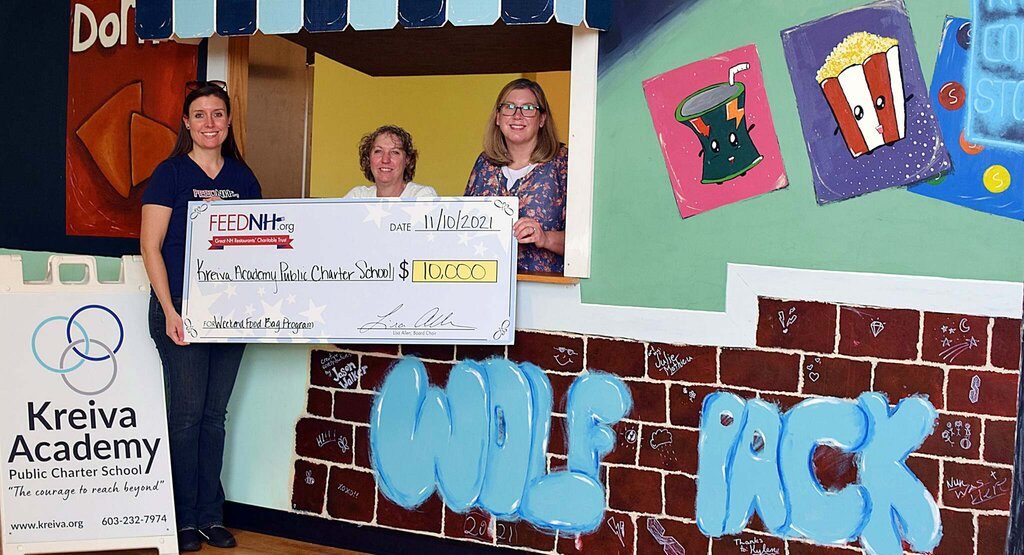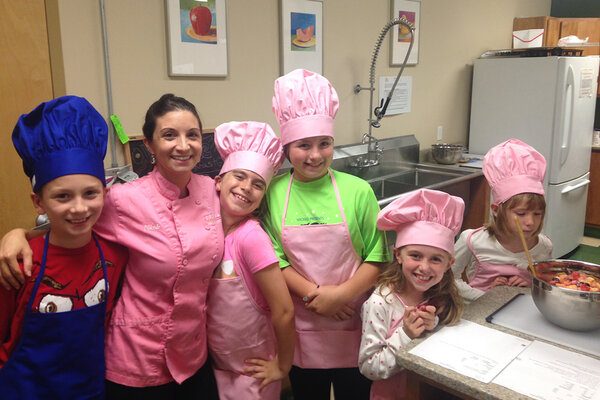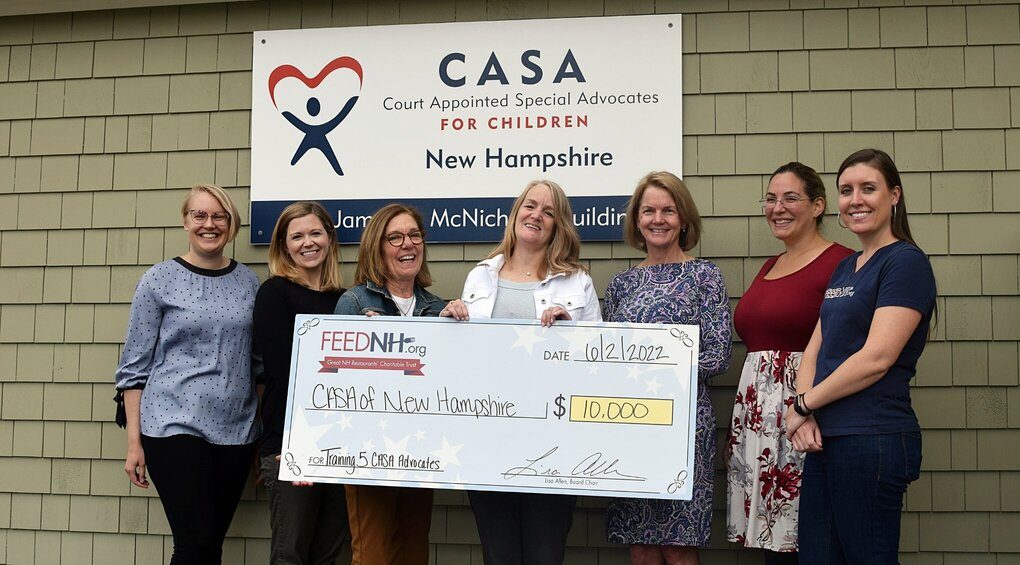By design, FEEDNH.org is able to address a wide range of issues in New Hampshire communities with sizeable gifts that make an impact. Hannaford has supported this nonprofit through the Fight Hunger Bag and Community Bag Programs.
Tell us about FEEDNH.org.
We are the charitable trust for Great New Hampshire Restaurants that includes T-BONES, CJ’s, Cactus Jack’s and Copper Door. We formed FEEDNH.org in 2014 as a nonprofit arm of our restaurant group, which is based only in New Hampshire.
FEEDNH is actually an acronym for Families, Elderly, Education and Disadvantaged. Our mission is to strengthen New Hampshire communities through philanthropic collaboration, dedicated employee involvement and volunteerism benefiting those four groups.
Our goal is to raise as much money as we can to help support our local New Hampshire nonprofits, and we are proud to say all of the funds we raise stay within the state of New Hampshire.
Our goal is to raise as much money as we can to help support our local New Hampshire nonprofits, and we are proud to say all of the funds we raise stay within the state of New Hampshire.
What sets your organization apart from others in your community?
What sets us apart from many of the nonprofits we interact with is that we reach such a wide range of individuals and families and nonprofits in general. Many nonprofits rightfully focus on a mission for one specific cause or target group. In our case, we can reach a variety and address multiple needs by giving sizeable gifts that really make an impact.
For us, the disadvantaged could be animals in an animal shelter, or the disadvantaged could be a homeless shelter for the homeless population. It’s just such a wide range. We did that by design because we wanted to help as many groups and individuals as possible!
That’s our goal, and I think that’s what sets us apart. We do extensive fundraising throughout the year. Nonprofits apply to us for support, and then our board determines if we can support a particular nonprofit and at what monetary level.
We try to align our donations with food funding support when we can because food is what we do. For example, we love to keep the education pieces of our acronym around food education or culinary education as much as possible. Sometimes we’re unable to support a nonprofit if they don’t fully align with our criteria, but most of the time, we can.
We do some fundraising events in the restaurants because we have a really loyal fan base in our guests, which is great. For example, we did a Halloween fundraiser called Wicked Scary Week at both of our Copper Door locations, and we decorated the restaurants in spooky Halloween decor. Guests donate $20 and then spin the prize wheel; they can’t lose. They’ll at least win $20 back off a future visit, up to $100. Our guests really look forward to it.
Another example is a Halloween-themed fundraiser at all of our T-BONES, CJ’s, and Cactus Jack’s locations called No Tricks, All Treats. Guests donate $10, but in return, they receive a coupon for $20 off a future visit, so they double their money. It’s a win-win for all!
And then, we have an annual golf tournament held in August every year at Manchester Country Club. It’s the biggest outside fundraiser that we do. In 2023, we’ll have our 10th anniversary golf tournament.
What sets us apart from many of the nonprofits we interact with is that we reach such a wide range of individuals and families and nonprofits in general.
Tell us a story that illustrates your organization’s good work.
I have a few quick snippets to share that will give you an idea of some things we’ve done and the range of our support.
Last year we supported Swim With a Mission, a nonprofit that supports pairing service dogs with veterans. We gave them a $15,000 donation, allowing them to pair five service dogs with veterans.
Another example is Krieva Academy Public Charter School in Manchester. We donated $10,000 to them, which covered their weekend food bag program for one full year. They have many students who need food assistance over the weekend, and they have volunteers who come in and prepare bags for them.

Although any donation, small or large, is helpful to a nonprofit in need, we try to ensure that whatever we provide will solve a whole issue. We want to make sure we’re really making a dent in what the nonprofit is trying to accomplish.
Another example is Farmsteads of New England, which works with adults with developmental disabilities. We donated a total of $10,000 over two years. One donation was to help with their heating system because their clients live on-site. But then we also helped them to expand their farmland. The residents work on the farm, harvest vegetables and learn to make various items, including pottery and learning to sew. This nonprofit has a variety of wonderful activities because once you turn 18, there are few resources available for adults. It’s a wonderful program.
My last example is Family Promise of Southern New Hampshire. Over the last few years, we’ve donated over $20,000 to this residential nonprofit for families in crisis with children. The families can move into this program and live in their own apartment. The residents are responsible for purchasing food they want as snacks or just things they would want on their own, but they often do big family-style meals. We’ve provided funding for them to purchase fresh fruits and veggies, meat, milk, spices and all those staples that continue to add up over time, especially with inflation. Our most recent donation to them was $10,000 as they’re continuing to grow and expand their reach in the community
What is your most outstanding achievement or contribution to the community?
We recently started a campaign called the Hill to One Mill. We have donated just a bit over $900,000 since FEEDNH.org was formed. We are planning a celebration event in January where we’ll be donating $165,000 to eleven high school culinary arts programs, each receiving $15,000 for their respective program.
I’m so excited that we’ve reached this point and are reaching a million dollars in donations. We invited 20 culinary schools in New Hampshire to apply for the donation, and the board voted on the winners.
At the January event, hosted at the Rex Theater in Manchester, the eleven winning schools will each prepare a sampling item for those in attendance to showcase one of their specialty items.
What do you want people to know about FEEDNH.org?
All the money we raise stays within the state of New Hampshire, and I think that’s important to our donors.
It’s certainly important to us because we’re New Hampshire grown, and we want to keep our funds local. Most of our donors are in New Hampshire, and we are grateful that our name and recognition are growing.
How will you use the funds raised from the Hannaford Helps Fight Hunger Bag and Community Bag Programs?
These funds will help support our programming. We have a program called The Great New Hampshire Kids Can Cook Program. When we first formed that, we were lucky enough to receive a $75,000 grant from the Harvard Pilgrim Healthcare Foundation. So, that kicked off this program where we provide cooking classes for students between the ages of about eight to 12 or 13.

We have two chefs working for our restaurant group who will go to Boys and Girls Clubs or The Girls Inc. or YMCAs or Girl Scout Troops, as examples, and do these cooking classes with the kids. They’ve developed a kid-friendly cookbook and the program is a series of at least three classes where the chefs cook a variety of the recipes with the mini chef participants. It’s great because it’s teaching these basic skills at such a young age, getting kids excited about eating healthy foods and feeling confident using kitchen utensils and equipment. We have kid-safe knives and teach them how to properly hold a piece of fruit and how to hold their fingers when cutting. They also learn a variety of food sanitation practices.
Since our initial grant from Harvard Pilgrim has run out, we try to do a variety of fundraising throughout the year on a smaller scale to keep that program running.
We’ve also worked with adults from the Moore Center in Manchester, which provides support services for adults with developmental disabilities. We have a class that teaches how to make fresh fruit salsa and yogurt parfaits. These funds can go to support the continuation of that program also.

Published December 15, 2022.
